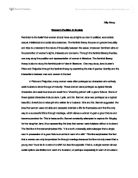“As the mistress of a respectable shore household, she wanted to protest being forced into a pattern of life which began with waving goodbye to a man, a pattern familiar to any harbor whore (Mishima 74).”
Even though Fusako desires to be Ryuji’s lover, she is unable to submit herself only because society and its standards constrain her from doing so. Contrariwise, Ryuji’s doubts of their relationship are centered on how he must leave the sea to be with Fusako. The sea itself represents what is pure and natural. Although humans make use of it, the sea itself is so vast that it is relatively un-manipulated by humans. On the contrary, land is tainted by the artificiality of society. Ryuji has doubts about being with Fusako because to do so, he must abandon nature and enter the artificial world. His abandonment of the sea for artificial society denotes a loss of power. This is supported by Noboru’s loss of respect for Ryuji as his identity as a sailor fades and is replaced by a new identity as a “materialistic” father:
“Are you kidding? A guy like that never does anything. He’s probably after your old lady’s money, that’ll be the punch line. First he’ll suck her out of everything she’s got and then, bang, bam. See you around, ma’am that’ll be the punch line (Mishima 50)”
The said passage reflects the children’s perspective of the loss of Ryuji’s self-sufficiency with his need of Fusako’s wealth, reflecting weakness. While Ryuji does not need vast wealth for power in the sea, land requires money, which Fusako possesses.
Mishima employs a study of contrasts in between Fusako and Ryuji. Fusako is the quintessence of the Japanese elite – maternally responsible, wealthy, materialistic and beautiful. Ryuji represents the opposite of Fusako – a symbol of freedom and spirit. Two opposite ends meet in their relationship, and it comes at a high price for both parties. Fusako must abandon her reputation, and Ryuji must abandon his freedom. But the very fact is that these two people are opposites only because of what society has labeled them – something that Mishima emphasizes with abundant detail of their aristocratic and sailing backgrounds in narration.
Traditionally, power has been reserved for adults, along with responsibility. Amidst the struggle for power adults have developed a system of class in society. This system of class cause both Fusako and Ryuji’s struggles, which limits the extents to which they can achieve self-satisfaction. The children’s struggles for power, which are not constrained by adult societal norms, in turn, contrast this. This presents an irony that insults artificial society and its backfired intentions of adult power.
It is arguable that the children in the work have an upper hand compared to the adults. The children enact their will with ease, and find power in the enactment of their will. Here Noboru expresses his satisfaction over killing a cat:
“I killed it all by myself… I can do anything, no matter how awful (Mishima 61).”
The children consistently find satisfaction in doing things that are out of the law. They are powerful because they are not part of society. Because they are not acknowledged as part of society, law cannot penalize their actions either, which they use to their advantage. Because they are outside of society, society is malleable to them. This reinforces the idea that society and its norms restrains people from achieving power and self-satisfaction, and that the lack of it allows freedom.
Symbols of artificiality and nature represent society and the lack of it. Because society is artificial, Mishima chose to portray Fusako as a wealthy owner of a luxury shop. Rex itself represents materialism and artificiality. The children, on the other hand, take pleasure in things that deal with nature. These include their ventures in finding “untouched” places, their attraction to the sea, and their fascination over animal anatomy. Glory and power itself is associated to whatever is natural, as seen in the book’s ending:
“Waves, as tepid as blood, inside an atoll. The tropical sun blaring across the sky like the call of a brass trumpet. The many-colored sea. Sharks…. He drank down the tepid tea. It tasted bitter. Glory, as anyone knows is bitter stuff (Mishima 181).”
The description of the sea in the end is significant as the sea is associated to glory. Thus Ryuji’s return to the sea represents his return to glory.
Although The Sailor Who Fell from Grace with the Sea contains a strong message concerning the dysfunctional nature of society and class, this message is not necessarily a moral one. The inappropriate behavior of the children is left unpunished and without atonement in the plot, which suggests that there is no consequence to murder and rebellion. In fact, the adults who act more accordingly lose, which suggests an unethical backbone to the story. However Mishima’s purpose of constructing plot and characterization in this manner is not to encourage immoral behavior, rather to satire how lack of acknowledgement of a group of people can cause potentially fatal repercussions.
In true spirit of Mishima’s cynicism, human beings have always had a tendency to complicate things for themselves. It is, after all, a virtual universality that there is no ideal state in life – an idea that Mishima conveys in the cracks of Fusako’s “ideal” household. At most, what we can do for power is to endeavor to strike a balance between the conformity and individuality portrayed in the adults and children’s lives. Worse come to worse, glory will come in its most bitter form: infinite dissatisfaction.
Bibliography
Mishima, Yukio. The Sailor Who Fell from Grace with the Sea. New York: Vintage, 2006.







